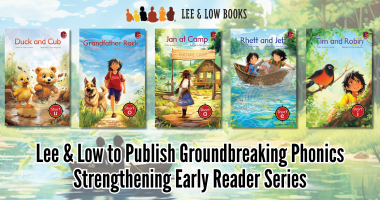Before Thanksgiving we had a great chat on Twitter with some of the contributing authors from our new dystopian anthology, Diverse Energies. Authors Cindy Pon, Malinda Lo, Ken Liu, Rahul Kanakia, Rajan Khanna, and K. Tempest Bradford joined us to answer some questions about their stories, dystopia, world-building, and more:
In one or two sentences, can you describe the dystopian worlds you’ve written about in Diverse Energies?
Malinda Lo: “The dystopian world in my story ‘Good Girl’ is a postapocalyptic NYC that politically resembles Communist China.”
Rahul Kanakia: “My story is set in a world where wealthy people have retreated into virtual reality and allowed the world to collapse. Also, there are pesticide-resistant bedbugs.”
Cindy Pon: “‘How had we drifted so far on what it meant to be human?‘ from my story sort of encapsulates it, in a world divided.”
Rajan Khanna: “Mine takes place in a world where an empire similar to the British Empire at its height uses child labor for mining.”
Ken Liu: “‘Pattern Recognition’ is about a school where children are safe. But only later do the children find out its real purpose.”
How did you decide on the specific settings where your stories take place?
Ken Liu: “My story took inspiration from a paper on human-powered computing & news about labor practices of Taiwanese manufacturers.”
Malinda Lo: “I wanted to write a story in a Big City that could be isolated in a disaster, and NYC fit well. As events have shown!”
Rajan Khanna: “I was inspired partly by a story about young kids in South Asia who ruin their bodies to make soccer balls.”
Cindy Pon: “The idea of setting it in Taipei came immediately. I was born there but left at age 6. So many memories are sensory based of Taipei. The city comes at all senses all the time.”
True or false: We are living in a dystopia.
Ken Liu: “I think far more of this planet’s population lives in a dystopia than most of us in the US are willing to acknowledge.”
Rajan Khanna: “I think from a teen standpoint, the world can often seem like a dystopia.”
K. Tempest Bradford: “Some people live in what others would see as a dystopia. It’s often a matter of perspective.”


Are oppressive governments a key part of dystopias?
Rajan Khanna: “For me, I associate that kind of oppression with dystopias. And I think that restriction of freedoms works as a YA theme.”
Malinda Lo: “My idea of ‘dystopian’ is firmly rooted in family stories/experience. I always think of oppressive governments first.”
Ken Liu: “I try to make my dystopias not about the government. I think other things are far more frightening than governments. . . . I think governments are often merely a symptom, not a cause. At least, not the cause.”
If not, are there elements that every dystopia needs?


Since these are short stories, any tips on how to build a world in very few pages?
Malinda Lo: “I think in short stories, world building must be done with some shorthand tricks. Can be hard. Shorthand tricks I like for worldbuilding in stories: food, names, twist on real-world setting that’s easily recognized. I cheated in the story by setting it in post-apoc NYC. Easy to “get”!”
Rahul Kanakia: “Most SF takes place in archetypical worlds: the Orwellian world; the gritty Blade Runner world, etc. The trick is knowing what mental image your reader starts the story with, and knowing how to deviate from that image. Most stories aren’t building worlds; they’re combining worlds that the readers have already ‘seen.'”
What is your favorite short story?
K. Tempest Bradford: “‘Even the Queen’ by Connie Willis. Far future story about menstruation (or lack thereof).”
Rajan Khanna: “‘There Will Come Soft Rains’ by Ray Bradbury.”
Rahul Kanakia: “Jorge Luis Borges’ ‘Library of Babel.’ Not sure the Diverse Energies readers will like it; when I made my students read it, they hated it. More apt example: ‘The Ones Who Walk Away From Omelas,’ by Le Guin.”
Malinda Lo: “Probably ‘The Bloody Chamber’ by Angela Carter.”
Cindy Pon: “Oh gosh. One of Stephen King’s I’m sure.”
You can read the whole chat on Storify.









